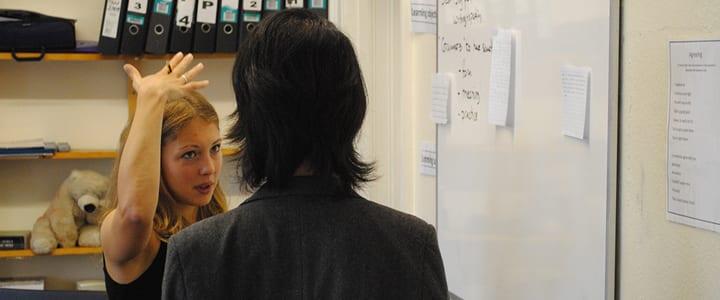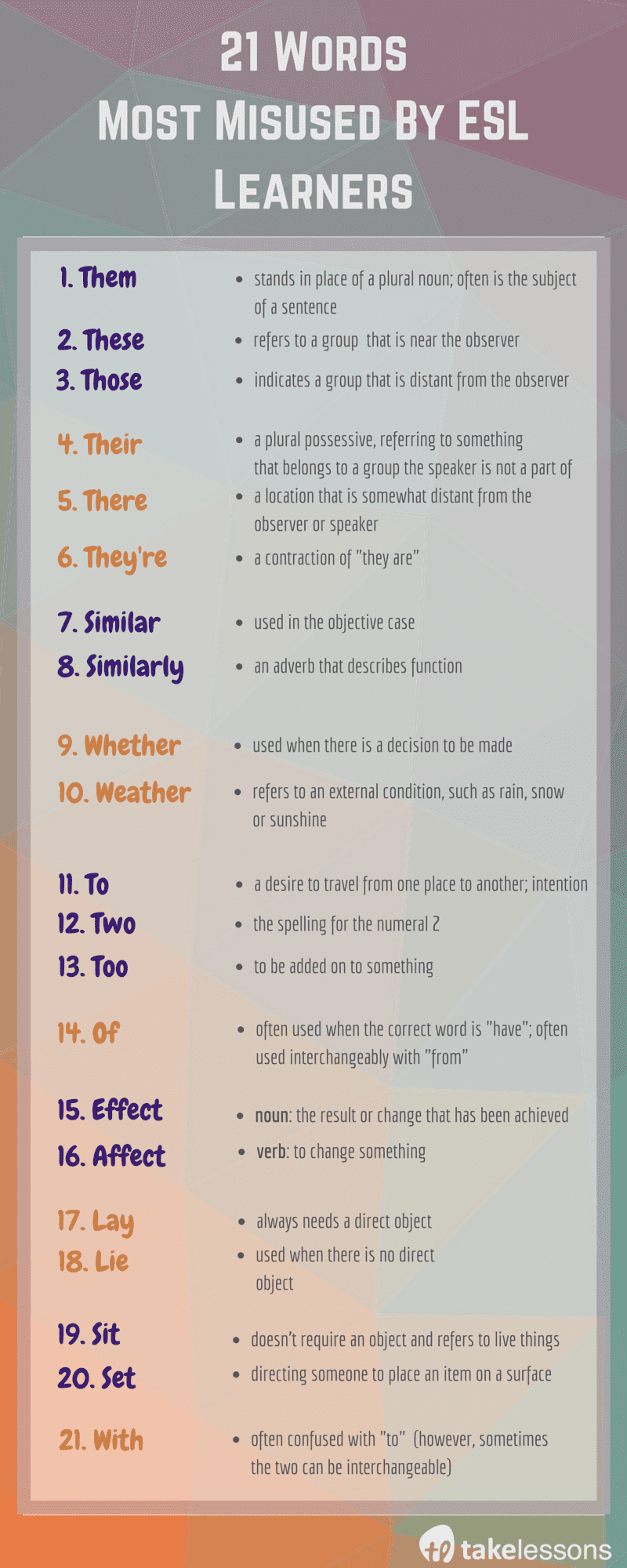 There are certainly some tricky words in the English language! And sometimes, people who have learned English as a second language mix up these words. Want to avoid making the same mistakes? Here are the words ESL learners misuse the most.
There are certainly some tricky words in the English language! And sometimes, people who have learned English as a second language mix up these words. Want to avoid making the same mistakes? Here are the words ESL learners misuse the most.
Them, Those, and These
“Them” is a pronoun that stands in the place of a plural noun. It is commonly used as the subject of a sentence, as in: Did you see them? or Have you seen the scissors? I used them to cut the labels off my T-shirts; now I can’t find them.
“Those” indicates a group that is distant from the observer, for example: Those girls are the ones who found the missing keys.
“These” refers to a group that is near the observer: These pencils are the ones I use for drawing.
Their, There, and They’re
These three words are frequently mixed up – even by native English speakers, let alone ESL learners.
“Their” is a plural possessive, referring to something that belongs to a group the speaker is not a part of. Look at this sentence: A common characteristic of the members of the Red-Headed League was their red hair.
“There” is a location that is somewhat distant from the observer or speaker, as in: Put the suitcases over there on the bed. However, it can also be used to refer to a state of being: There are 12 items in one dozen.
“They’re” is a contraction of “they are,” as in: They are going to the store.
Similar/Similarly
“Similar” is used in the objective case, whereas “similarly” is an adverb that describes function. For example: Apples are similar to pears in that they are both fruit vs. Laptops function similarly to desktop computers.
Whether/Weather
“Whether” is used when there is a decision to be made, as in: I am not sure whether or not I should mow the lawn.
“Weather” refers to an external condition, such as rain, snow, or sunshine. Here’s an example of both: I’d better mow the grass, whether I want to or not, because the weather report is predicting rain for tomorrow.
To, Too, and Two
Again, these are homonyms (words that sound alike but are spelled differently) that are often confused by ESL learners. Here are some examples:
I am going to the store. – Indicates a desire to travel from one place to another.
I meant to do it. – Indicates intention.
If you are going to the store, I want to go, too. – Here, “too” means to be added on to something.
If the two of us go to the store, we can carry back the ice cream, and some soda pop, too. – “Two” is the spelling for the numeral two.
Of
“Of” often gets used when the correct word is “have.” For example: I should of done it. Instead, the correct written statement is: I should have done it, which is frequently contracted into: I should’ve done it.
“Of” also gets used interchangeably with “from”: My feet felt as if they were made of/from lead.
Affect/Effect
This is a word combination that will have native English speakers reaching for a dictionary. Simply put, “to affect” something is to change it (it’s usually used as a verb), but “effect” is the result or change that has been achieved.
Examples:
To affect change in the environment, everyone must work together.
Internal combustion engines have a negative effect on the air quality.
Lay/Lie
“Lay” always needs a direct object, whereas “lie” is used when there is no direct object.
Example: Please lay the suitcases on the floor, so that I can lie down on the bed.
Sit/Set
“Sit” doesn’t require an object and refers to live things—similar to lay/lie. “Set” is used when directing someone to place an item on a surface.
Example: Sit down in the comfy chair, and I will set the tea table in front of you.
With
“With” is often confused with “to” – and this is made even more confusing by the alternation sometimes being correct usage. For example: Ford Rangers, when compared to/with Ferraris, are a much better buy for a working man. However, even though you might say, I will go to the store, you would not say, I will go with the store.
Looking to improve your speaking or writing skills? Search for a private English or ESL tutor today!
Guest Author: Cari Bennette is a blogger and content creator at custom writing service Jet Writers. Her favorite topics are academic writing, education, blogging, and career. Feel free to drop her a line on Twitter.
Photo by Shane Global
Suzy S.

